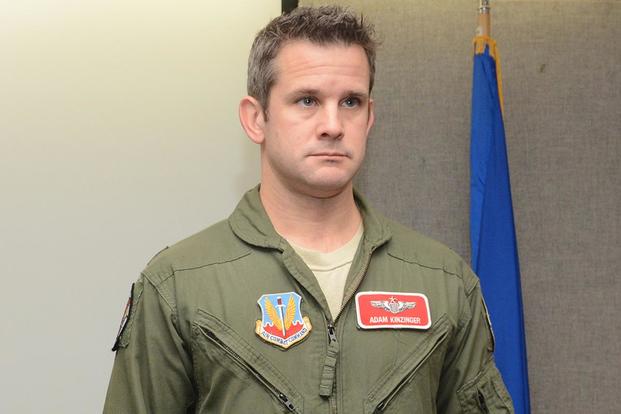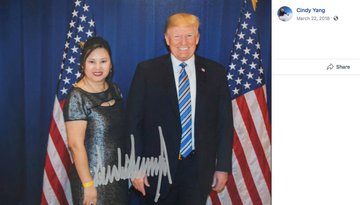
FILE PHOTO-- Maj. Adam Kinzinger stands as The Meritorious Service Medal award package is read during a ceremony at Truax Field, Madison, Wis., March 5, 2016. Kinzinger received the award for various mission accomplishments (U.S. Air National Guard/Staff Sgt. Andrea F. Rhode)
8 Mar 2019
Military.com | By Dr. Jessica D. Blankshain
Jessica D. Blankshain is an assistant professor of National Security Affairs at the U.S. Naval War College. All views expressed are the author's own and do not represent the views of the United States government, Department of Defense, Department of the Navy, or U.S. Naval War College.
One of the things most people agree on regarding U.S. civil-military relations is that the military should stay out of politics. But how do we keep the military out of politics when politicians are in the military?
Adam Kinzinger, representative for Illinois' 16th Congressional District and a lieutenant colonel in the Wisconsin Air National Guard, is facing scrutiny for tweets and media appearances in which he criticized Wisconsin's governor, Tony Evers, for deciding to withdraw Wisconsin National Guard troops from the southern border.
Ultimately the Wisconsin Guard determined Kinzinger’s remarks were not a problem, announcing March 7 that a review had found he was speaking in his capacity as a Congressman, not a military officer.
But this dustup also highlights broader issues raised by members of the National Guard (and service reserves) serving concurrently in political office.
Members of the National Guard and reserve serving in Congress has been relatively uncontroversial for nearly 200 years. In the early 1800s, the House took action against a member who joined the militia between congressional sessions, arguing that it violated the Incompatibility Clause (Article 1 Section 6 of the U.S. Constitution), which prohibits individuals from serving in the executive and legislative branches simultaneously.
The law defining "employees" has since been reworded to avoid this issue but, in recent years, the question of legislators serving in the Guard and reserve has begun to draw attention from those who study American civil-military relations. This interest may be driven in part by the effects of the "Abrams Doctrine," which moved many critical capabilities into the Guard and reserve after Vietnam. [There are, of course, significant differences between the National Guard and service reserves, both in terms of force structure and relationship to state and federal government, but for present purposes I consider them together.]
Beginning roughly near the end of the Cold War and accelerating after 9/11, the United States has shifted from having a largely strategic reserve component -- "weekend warriors" who did not expect to deploy unless there was a crisis -- to having an operational reserve in which members of the Guard and reserve expect to deploy regularly in support of ongoing operations overseas, from the peacekeeping missions of the 1990s to combat operations in Iraq and Afghanistan in the 2000s and beyond.
As a result, members of the Guard and reserve may now be perceived less as civilians who take up arms in time of need and more as part-time professional soldiers who have more in common with their active-duty counterparts than with average Americans.
Given the professional military's strong apolitical ethic, whether and when we view members of the Guard and reserve as members of the military profession has important implications for how we evaluate their political activity (similar to discussions of political participation by retired officers).
There can, of course, be benefits to having members of the Guard and reserve serving in Congress or other political offices. Their military experience may inform their lawmaking and oversight. And as we were somberly reminded by the death of Brent Taylor, a Utah National Guard major and mayor of North Ogden, in Afghanistan last year, they may also serve as a link between civilian communities and the military fighting on their behalf.
But there are challenges, too, as Rep. Kinzinger's case makes clear. When an officer who is also a politician publicly criticizes orders from his commander in chief, who belongs to a different political party, it raises concerns about good order and discipline within the military and, perhaps most significantly, it makes it harder to keep clear separation in the public mind between the military and politics. As the reserve component's role in the military has shifted, so too has the balance of these pros and cons.
Kinzinger's personal criticism of the governor highlights that concerns about good order and discipline are linked with concerns about politicization. On Twitter, Kinzinger questioned whether Evers visited to the border himself to understand the deployment or instead made a "political" decision. In a Fox News interview, he said that he was breaking the news of the withdrawal because he believed the governor didn't have the courage to do so. While these comments would not be particularly remarkable coming from a member of the opposing political party, they look very different coming from an officer in that state's National Guard. Kinzinger, of course, is both. How will his fellow Wisconsin Guard members, whom he will continue to serve alongside, perceive these comments?
Kinzinger's remarks also raise concerns about public perceptions of the politicization of the military. One of the main reasons Kinzinger's comments held weight was that he had just returned from a deployment to the border and drew on his experience there to support his criticism of the withdrawal. In the Fox appearance in particular, the hosts and Kinzinger all position him as a neutral expert drawing on his two-week deployment to the border to make a policy judgment, in contrast to partisan politicians who oppose the president's declaration of national emergency for political reasons.
Kinzinger is explicitly critical of Democrats, both in Congress and in state government. He might be perceived as trying to have it both ways -- using his apolitical military credibility to go after political opponents -- which could have implications for the public's view of the military as an institution. This last point is perhaps of most concern, given the high level of confidence the American public has in the military compared to elected officials, as well as indications that this confidence is increasingly taking on partisan dimensions.
Kinzinger's situation is by no means unique. There were at least 16 members concurrently serving in the Guard or reserve and the 115th Congress, and the intention of this piece is not to single him out for scrutiny. The shift from a strategic to an operational reserve component has changed the relationship between the reserve component and society, and we should be cognizant of those changes when thinking about how members of the Guard and reserve balance their military service with their political service.
Such a reassessment wouldn't require a ban on concurrent service, but might mean developing either explicit regulations or implicit norms around which issues such members should recuse themselves on, what boundaries they draw on their partisan political speech, or to what degree they invoke their service while campaigning and governing.
-- The opinions expressed in this op-ed are those of the author and do not necessarily reflect the views of Military.com. If you would like to submit your own commentary, please send your article to opinions@military.com for consideration.
Above is from: https://www.military.com/daily-news/2019/03/08/should-elected-officials-be-allowed-serve-military-its-complicated.html




